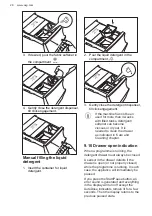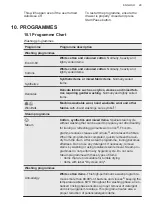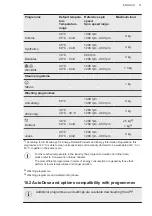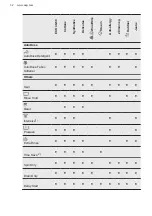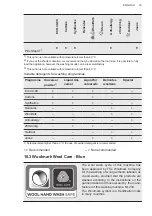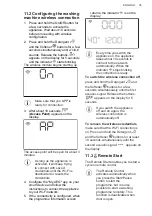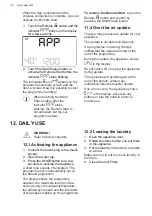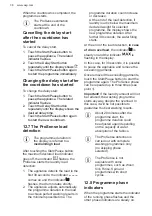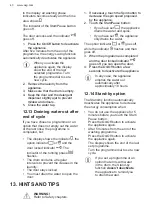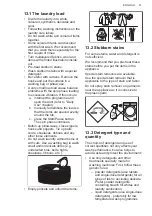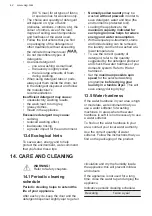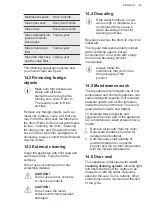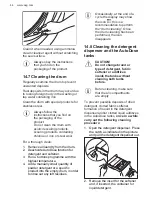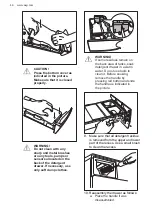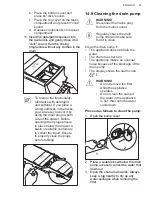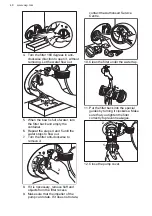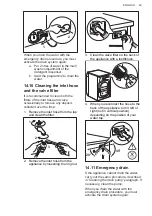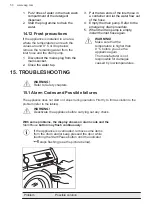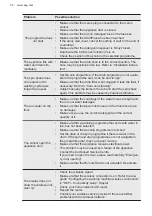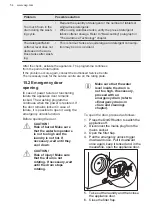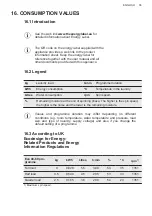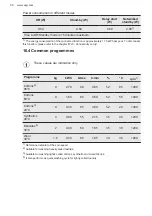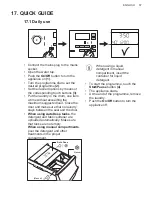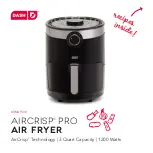
(60 °C max) for all types of fabric,
or special ones for woollens only.
• The choice and quantity of detergent
will depend on: type of fabric
(delicates, woollens, cottons, etc), the
colour of clothes, size of the load,
degree of soiling, wash temperature
and hardness of the water used.
• Follow the instructions that you find
on packaging of the detergents or
other treatments without exceeding
the indicated maximum level (
).
• Do not mix different types of
detergents.
• Use less detergent if:
– you are washing a small load,
– the laundry is lightly soiled,
– there is large amounts of foam
during washing.
• When using detergent tabs or pods,
always put them inside the drum, not
in the detergent dispenser and follow
the manufacturer's
recommendations .
Insufficient detergent may cause:
• unsatisfactory washing results,
• the wash load to turn grey,
• greasy clothes,
• mould in the appliance.
Excessive detergent may cause:
• sudsing,
• reduced washing effect,
• inadequate rinsing,
• a greater impact for the environment.
13.4 Ecological hints
To save water, energy and to help
protect the environment, we recommend
that you follow these tips:
• Normally soiled laundry may be
washed without prewash in order to
save detergent, water and time (the
environment is protected too!).
• Loading the appliance to the
maximum capacity indicated for
each programmes helps to reduce
energy and water consumption.
• With adequate pre-treatment, stains
and limited soiling can be removed;
the laundry can then be washed at a
lower temperature.
• To use the correct quantity of
detergent, refer to the quantity
suggested by the detergent producer
and check the water hardness of you
domestic system. Refer to 'Water
hardness'.
• Set the maximum possible spin
speed for the selected washing
programme before drying your
laundry in a tumble dryer. This will
save energy during drying!
13.5 Water hardness
If the water hardness in your area is high
or moderate, we recommend that you
use a water softener for washing
machines. In areas where the water
hardness is soft it is not necessary to use
a water softener.
To find out the water hardness in your
area, contact your local water authority.
Use the correct quantity of water
softener. Follow the instructions that you
find on the packaging of the product.
14. CARE AND CLEANING
WARNING!
Refer to Safety chapters.
14.1 Periodic cleaning
schedule
Periodic cleaning helps to extend the
life of your appliance.
After each cycle, keep the door and the
detergent dispenser slightly ajar to get air
circulation and dry the humidity inside
the appliance: this will prevent mildew
and odours.
If the appliance is not used for a long
time: close the water tap and unplug the
appliance.
Indicative periodic cleaning schedule:
Descaling
Twice a year
www.aeg.com
42

